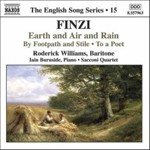various (E)
Abbreviations (PDF)
Boosey & Hawkes
1.To a poet a thousand years hence (Flecker) 2.On parent knees (attrib.William Jones) 3.Intrada (Traherne) 4.The birthnight (de la Mare) 5.June on Castle Hill (F.L.Lucas) 6.Ode on the rejection of St Cecilia (George Barker)
The song To a poet had a special significance for Finzi as something of an artistic credo, in which time is the ultimate and apt testimony for a creative artist. A first version was written in the 1920s, and the composer buried a copy of the song under the porch when his new house at Ashmansworth was being built, returning to revise the song in the early war years. He selected the song as one of his most satisfying creations, along with June on Castle Hill. The latter dates from the same wartime period and can be seen as a direct response to Finzi’s despairing reaction to darkening events in Europe. Intrada sets the Traherne poem that also inspired the opening orchestral movement of Dies natalis, while the Ode on the rejection of St Cecilia provided the composer with a biting modernist antithesis to his work on Blunden’s celebratory Ode to St Cecilia.

Roderick Williams (baritone)
Iain Burnside (piano) / Sacconi Quartet
Naxos 8.557963

